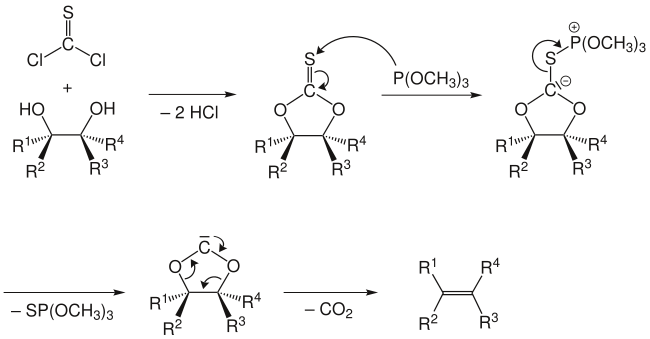Corey–Winter olefin synthesis
The Corey–Winter olefin synthesis (also known as Corey–Winter–Eastwood olefination) is a series of chemical reactions for converting 1,2-diols into olefins.[1][2][3][4] It is named for the American chemist and Nobelist Elias James Corey and the American-Estonian chemist Roland Arthur Edwin Winter.[5]

Often, thiocarbonyldiimidazole is used instead of thiophosgene as shown above, since thiophosgene has a similar toxicity profile as phosgene, whereas thiocarbonyldiimidazole is a much safer alternative.
Mechanism[edit]
The reaction mechanism involves the formation of a cyclic thiocarbonate from the diol and thiophosgene. The second step involves treatment with trimethyl phosphite, which attacks the sulfur atom, producing S=P(OMe)3 (driven by the formation of a strong P=S double bond) and leaving a carbene.[6] This carbene collapses with loss of carbon dioxide to give the olefin.

An alternative mechanism does not involve a free carbene intermediate, but rather involves attack of the carbanion by a second molecule of trimethylphosphite with concomitant cleavage of the sulfur-carbon bond. The phosphorus stabilized carbanion then undergoes an elimination to give the alkene, along with an acyl phosphite, which then decarboxylates.

The Corey-Winter olefination is a stereospecific reaction:[1] a trans-diol gives a trans-alkene, while a cis-diol gives a cis-alkene as the product. For instance, cis- and trans-1,2-cyclodecanediol gives the respective cis- and trans-cyclodecene.
References[edit]
- ^ a b Corey, E. J.; Winter, R. A. E. (1963). "A New, Stereospecific Olefin Synthesis from 1,2-Diols". J. Am. Chem. Soc. 85 (17): 2677–2678. doi:10.1021/ja00900a043.
- ^ Corey, E. J.; Carey, F. A.; Winter, R. A. E. (1965). "Stereospecific Syntheses of Olefins from 1,2-Thionocarbonates and 1,2-Trithiocarbonates. trans-Cycloheptene". J. Am. Chem. Soc. 87 (4): 934–935. doi:10.1021/ja01082a057.
- ^ Corey, E. J.; Hopkins, J. (1982). "A mild procedure for the conversion of 1,2-diols to olefins". Tetrahedron Lett. 23 (19): 1979–1982. doi:10.1016/S0040-4039(00)87238-X.
- ^ Crank, G.; Eastwood, F. W. (1964). "Derivatives of orthoacids. II. The preparation of olefins from 1,2-diols". Australian Journal of Chemistry. 17 (12): 1392–1398. doi:10.1071/CH9641392.
- ^ Block, E. Org. React. 1984, 30, 457. doi:10.1002/0471264180.or030.02
- ^ Horton, D.; Tindall, Jr., C. G. J. Org. Chem. 1970, 35(10), 3558-3559. (doi:10.1021/jo00835a082)
